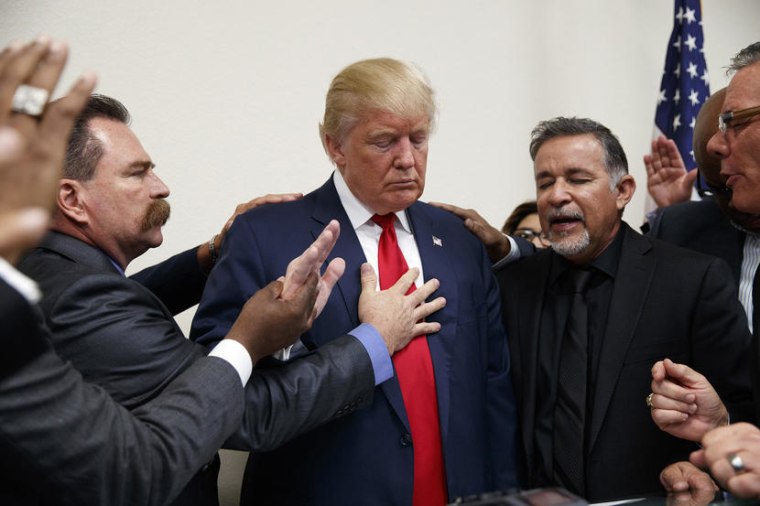In public, Donald Trump presents himself as someone who honors and celebrates military service, but in private, it appears to be a very different story. Earlier this month, Jeffrey Goldberg wrote a stunning piece in The Atlantic about the Republican president denigrating those who wear the uniform, dismissing fallen heroes as "losers" and "suckers."
Similarly, Trump also presents himself in public as a hero to people of faith, most notably Christian conservatives who are at the heart of his political base. It's against this backdrop that The Atlantic has a new piece today from McKay Coppins, reporting that the president is quick behind closed doors to mock and show contempt for theistic allies.
In speeches and interviews, Trump routinely lavishes praise on conservative Christians, casting himself as their champion.... But in private, many of Trump's comments about religion are marked by cynicism and contempt, according to people who have worked for him. Former aides told me they've heard Trump ridicule conservative religious leaders, dismiss various faith groups with cartoonish stereotypes, and deride certain rites and doctrines held sacred by many of the Americans who constitute his base.
Coppins added that the president has felt a certain kinship with prosperity preachers -- who often tell their followers to make donations they can't afford, confident that they'll receive divine rewards in exchange -- "often evincing a game-recognizes-game appreciation for their hustle."
In other words, Trump saw these preachers as con artists, and if the reporting is correct, he recognized their skills as familiar because of his own expertise in the area.
The former campaign adviser recalled showing his boss a YouTube video of the Israeli televangelist Benny Hinn performing "faith healings," while Trump laughed at the spectacle and muttered, "Man, that's some racket." On another occasion, the adviser told me, Trump expressed awe at Joel Osteen's media empire -- particularly the viewership of his televised sermons.
To be sure, I don't imagine anyone will read this report and come away as shocked. There's long been a phony veneer to the Republican's professed interest in matters of faith, with Trump seeing religion as a means to an end: if he can use religion and religious people to advance his ambitions, the president is happy to play along.
What's less clear to me is whether those Trump reportedly mocks in private will care, even if they believe every word of The Atlantic's new article.
Conservative faith communities long ago accepted the terms of an ugly deal: they'd look past Trump's scandals, corruption, incompetence, and total lack of personal integrity, and in exchange, the president would appoint far-right judges and generally follow the script the religious right wants to see the White House follow.
The agreement has, by and large, worked for both parties: Christian conservatives have stood by their Oval Office ally, and Trump has generally kept his promises to them. It's amoral and devoid of principle, but the deal has delivered predictable results.
And so, if/when Christian conservatives see this reporting, will they be surprised? Offended? Outraged? Less inclined to continue to support the president who privately holds them in contempt?
Almost certainly not.

